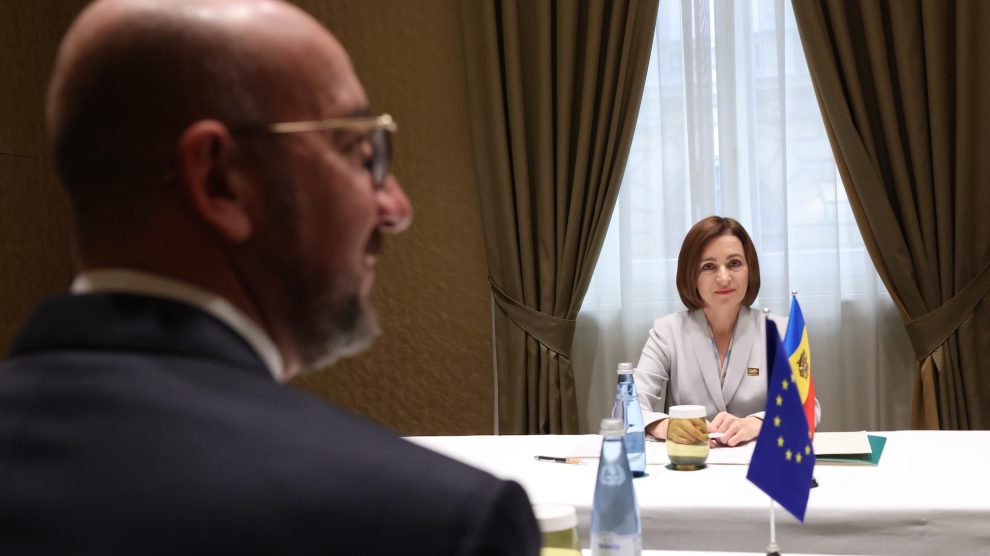The fight against corruption is non-negotiable if the Republic of Moldova wants to join the European Union.
After winning a runoff presidential vote and scoring a razor-thin victory in a referendum on Moldova’s future direction of travel (the country chose the EU), President Maia Sandu now has an even harder battle ahead that she cannot afford to lose: reforming a notoriously corrupt justice system.
Zero tolerance towards corruption has been the driving force behind both of Sandu’s successful presidential bids. Sandu’s re-election in this month also reconfirms the support Moldovans have given her to reform the justice system.
- How could EU membership transform Moldova?
- ‘Now is the time to invest in Moldova’
- Moldova’s ambitious targets for green energy
Since 2020 the administration in Chișinău has taken consistent steps in ridding the system of some of its many ills, yet much more needs to be done.
Improving the judiciary is never an easy task, and it has proven time and again to be one of the biggest challenges once-communist states have had to face in their bid for EU integration and outright state reform.
Nowhere is this feat more daunting than in Moldova, wedged between the European Union and Russia. Yet intimidating as it may be, Sandu has to make good on her promise and act to change the judiciary to give the citizens of Moldova a fairer system.
What’s wrong with Moldova’s judicial system?
Reforming the judiciary is as complex as it is necessary for Moldova. It’s no secret that resistance to change within the system remains strong and only limited progress has been registered so far.
Sandu herself admitted in a televised presidential debate on October 27 that the promised judicial reform—including combating corruption and overhauling the Prosecutor-General’s Office—had been slow and vowed such measures would be more efficient in the future.
Previously she talked about how the judicial system remains resistant to change, biased and easily manipulated by powerful elites. When judges are controlled by oligarchs it undermines efforts for meaningful change and real progress.
Corruption and uneven judicial practices are plaguing the system. One of the most glaring such dysfunctions is the 2014 banking fraud, which saw over one billion US dollars disappear from Moldova’s financial system without any top officials being held accountable.
Institutions tasked with overhauling the system and checking the integrity of prosecutors and judges fall short of public expectations. Some 95 per cent of Moldovan citizens who support EU accession consider that justice reform is crucial. Despite claims from the Anti-Corruption Prosecutor’s Office that all is on track, fugitives like Ilan Shor and the notorious Vladimir Plahotniuc are still able, from outside of the country, to meddle in Moldova’s internal affairs.
Police investigations have showed how oligarchs have been involved in vote buying and illegal financing of political parties backed by Kremlin. The failure of the relevant judicial institutions to act gave pro-Russian groups leeway to jeopardise the election process.
Why justice reform is so important, and what Brussels can do
There’s no clear path for EU integration without judicial reform. The fight against corruption is non-negotiable if the Republic of Moldova wants to join the European Union.
Strong institutions able to keep Moldova safe and stay impervious to Russian influence depend on popular confidence and support.
And in order for citizens to regain confidence in the system the Moldovan judiciary needs skilled and determined leadership to hold everyone equally responsible before the law.
Brussels must support and encourage the strong and tough reforms needed to modernise Moldova’s judiciary.
Last year the European Parliament approved a 145 million euros package for Moldova, part of which was aimed at helping with this much need justice reform.
Green MEP Markéta Gregorova said that only by making Moldova’s institutions less vulnerable can we spare the country from becoming the next Ukraine.
Additionally, another MEP, this time from European People’s party, Rareş Bogdan, spearheaded an initiative in the European Parliament to secure 45 million euros to help combat disinformation in Moldova, disinformation which also might influence judicial proceedings.
These measures are intended to help Maia Sandu combat corruption. It is by no means an easy task, and there will be a strong backlash from some within the system. Nevertheless, it remains the only way forward for Moldova. Much hangs on a successful reform of the judicial system, not least the European future of Moldova and the safety of its citizens.
Photo: Maia Sandu with President of the European Council Charles Michel at a meeting of the European Political Community on November 7. © European Union.
At Emerging Europe, we use an integrated approach centred around market intelligence to help organisations understand trends and strategically position themselves for success.
Learn how our solutions can help you thrive in the region:
Company and Services Overview | Strategic Advantage.

